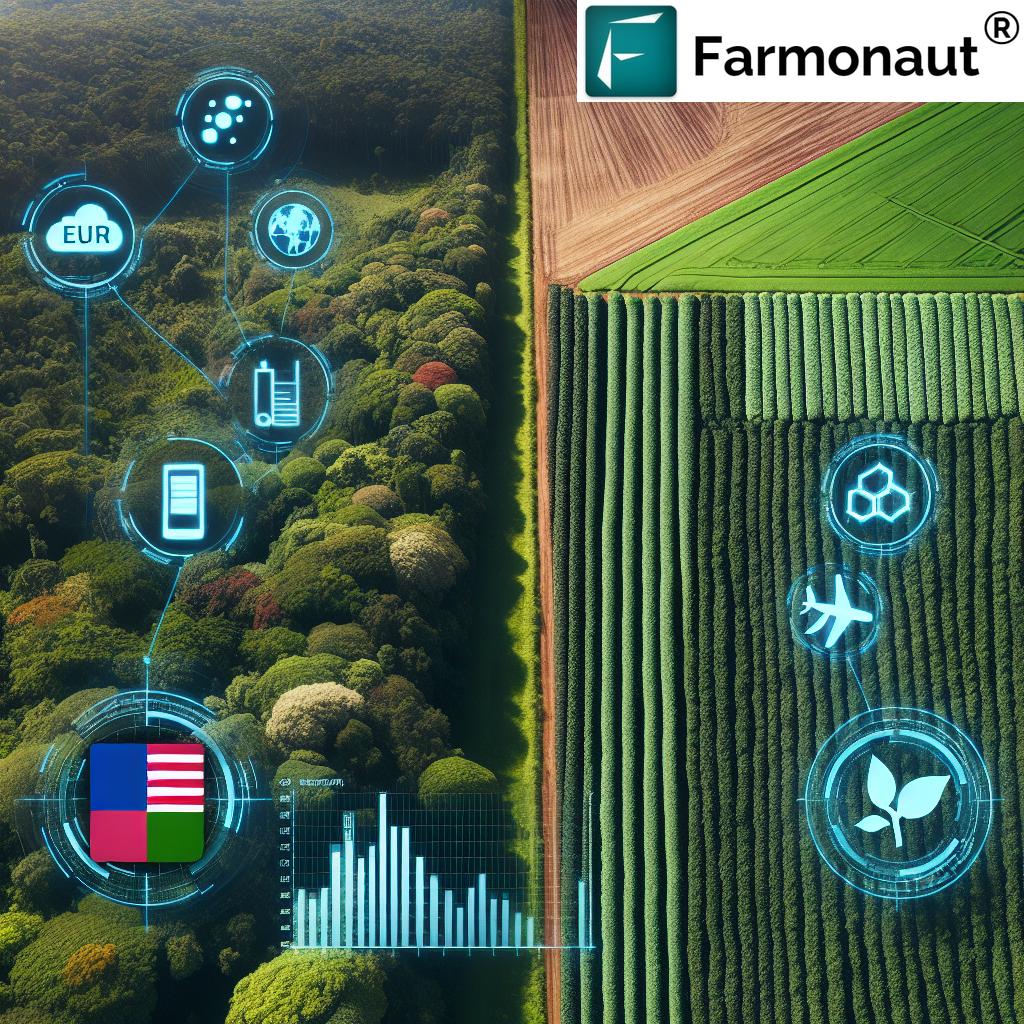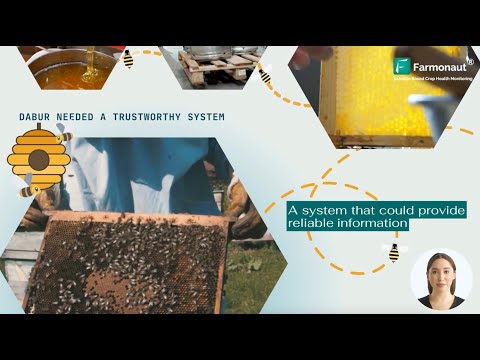EU Deforestation Regulation: How Farmonaut’s Plot-Level Traceability Ensures Sustainable Agricultural Supply Chains

In the global fight against climate change and environmental degradation, the European Union has taken a significant step forward with the introduction of the EU Deforestation Regulation (EUDR). This landmark legislation is set to transform agricultural supply chain traceability and combat commodity-driven deforestation on a global scale. As we delve into the intricacies of this regulation and its far-reaching implications, we at Farmonaut are at the forefront of providing innovative solutions to ensure compliance and promote sustainable farming practices.
“The EU Deforestation Regulation, postponed until 2025-2026, will impact 3 major commodities: palm oil, soy, and wood products.”
Understanding the EU Deforestation Regulation
The EUDR, initially slated for implementation but postponed until 2025-2026, represents a paradigm shift in how we approach the intersection of global trade and environmental conservation. At its core, this regulation mandates that companies ensure their products are deforestation-free and legally sourced. This requirement extends to a range of commodities that have historically been associated with forest conversion risks, including palm oil, soy, wood products, cocoa, coffee, and leather.
The regulation’s primary objectives are to:
- Minimize the EU’s contribution to global deforestation and forest degradation
- Promote sustainable supply chains
- Protect biodiversity and indigenous peoples’ rights
- Combat climate change by preserving crucial carbon sinks
To achieve these goals, the EUDR introduces stringent due diligence requirements for operators and traders dealing with regulated commodities. This includes comprehensive risk assessments, mitigation measures, and the implementation of robust traceability systems to track products from their point of origin to the EU market.
The Challenge of Plot-Level Traceability in Agriculture
One of the most significant challenges posed by the EUDR is the requirement for plot-level traceability. This level of detail demands that companies can trace their agricultural products back to the specific plots of land where they were grown. For many industries, especially those with complex, global supply chains, this represents a monumental shift in operational practices.
The challenges of implementing plot-level traceability include:
- Data collection and management across diverse geographical locations
- Integration of smallholder farmers into traceable supply chains
- Verification of land use history to ensure deforestation-free status
- Balancing transparency with data privacy concerns
- Technological barriers in remote agricultural regions
These challenges are particularly acute in sectors such as palm oil production in Southeast Asia, soy farming in South America, and wood products sourced from various tropical regions. Each of these commodities presents unique traceability hurdles that must be overcome to ensure compliance with the EUDR.
Farmonaut’s Innovative Approach to EUDR Compliance
At Farmonaut, we recognize the urgent need for advanced forest conservation technologies and sustainable farming practices. Our satellite-based farm management solutions are uniquely positioned to address the challenges posed by the EUDR, particularly in the realm of plot-level traceability.
Explore our comprehensive solutions:
Our platform offers:
- Satellite-Based Crop Health Monitoring: We utilize multispectral satellite imagery to provide real-time insights into vegetation health, soil moisture levels, and other critical agricultural metrics. This data is invaluable for tracking land use changes and ensuring that agricultural expansion does not come at the cost of forest conservation.
- Blockchain-Based Product Traceability: Our integration of blockchain technology enables secure and transparent tracking of commodities from farm to consumer. This robust traceability system is crucial for meeting the EUDR’s stringent requirements and building trust throughout the supply chain.
- AI-Driven Advisory Systems: Our Jeevn AI provides personalized farm management advice, helping farmers optimize their practices for sustainability and productivity. This technology is key to promoting deforestation-free commodities and sustainable agricultural practices.
- Carbon Footprint Tracking: We offer real-time data on emissions, allowing businesses to monitor and reduce their environmental impact. This feature is essential for companies looking to demonstrate their commitment to sustainability under the EUDR framework.
Impact on Global Commodity Markets
The implementation of the EUDR is expected to have far-reaching consequences for global commodity markets, particularly those linked to deforestation risks. Let’s examine the potential impacts on key sectors:
Palm Oil Industry
The palm oil industry, primarily concentrated in Southeast Asia, faces significant challenges under the EUDR. As one of the most scrutinized commodities due to its historical association with tropical deforestation, palm oil producers must now demonstrate unprecedented levels of traceability and sustainability.
Farmonaut’s satellite monitoring capabilities are particularly valuable in this context, allowing for:
- Real-time tracking of plantation boundaries
- Detection of any encroachment into protected forest areas
- Monitoring of sustainable palm oil production practices
- Verification of deforestation-free claims at the plot level
Soy Production
Soy, a major driver of deforestation in South America, is another key commodity affected by the EUDR. The regulation’s impact on soy farming is expected to be profound, potentially reshaping agricultural practices across vast regions.
Our platform supports sustainable soy farming through:
- Precision agriculture techniques to optimize yield on existing farmland
- Monitoring of land use changes to prevent expansion into forested areas
- Integration of smallholder farmers into traceable supply chains
- Data-driven insights to support agricultural due diligence processes
Wood Products and Pulp
The timber industry, including wood products and pulp, faces unique challenges under the EUDR. Tracing wood products back to their source requires a complex understanding of forest management practices and supply chain dynamics.
Farmonaut’s technology aids in:
- Mapping and monitoring of forest canopy changes
- Tracking of timber harvesting activities
- Verification of sustainable forestry practices
- Integration with existing chain-of-custody systems for enhanced traceability
“Companies must now ensure 100% plot-level traceability for their agricultural products to comply with the EU Deforestation Regulation.”
The Role of Technology in EUDR Compliance
As we navigate the complexities of the EUDR, it’s clear that technology plays a pivotal role in enabling compliance and driving sustainable practices. Farmonaut’s suite of tools represents the cutting edge of agricultural technology, offering solutions that are not only compliant with EUDR requirements but also promote long-term sustainability and efficiency in farming operations.
Discover our API solutions for seamless integration:
Farmonaut API
API Developer Docs
Key technological advancements facilitating EUDR compliance include:
- Remote Sensing: Satellite imagery and LiDAR technology enable comprehensive monitoring of land use changes and forest cover.
- Artificial Intelligence: Machine learning algorithms can analyze vast datasets to identify patterns and predict potential deforestation risks.
- Blockchain: Distributed ledger technology ensures the integrity and transparency of supply chain data.
- Internet of Things (IoT): Sensors and connected devices provide real-time data on agricultural practices and environmental conditions.
- Big Data Analytics: Advanced analytics tools help companies make sense of complex supply chain data and identify areas for improvement.
Implications for Tropical Deforestation Monitoring
The EUDR’s focus on commodities linked to tropical deforestation highlights the critical need for improved monitoring systems in these vulnerable ecosystems. Tropical forests, home to incredible biodiversity and crucial for global climate regulation, have been under immense pressure from agricultural expansion and resource extraction.
Farmonaut’s advanced monitoring capabilities contribute to tropical deforestation monitoring by:
- Providing high-resolution satellite imagery of tropical regions
- Enabling rapid detection of forest disturbances and land use changes
- Supporting the mapping of high conservation value (HCV) areas
- Facilitating collaboration between governments, NGOs, and private sector actors in forest conservation efforts
By leveraging these technologies, we can create a more robust framework for protecting tropical forests while supporting sustainable agricultural development.
Impact on Indigenous Peoples and Local Communities
The EUDR recognizes the crucial role of indigenous peoples and local communities in forest conservation. As such, it emphasizes the importance of respecting land rights and traditional knowledge in sustainable land management practices.
Farmonaut’s approach to supporting indigenous rights includes:
- Participatory mapping tools to document traditional land use
- Integration of local knowledge into agricultural advisory systems
- Support for community-based monitoring initiatives
- Capacity building programs to enhance local engagement with traceability systems
By empowering indigenous communities with technology and data, we can ensure that their voices are heard and their rights protected in the implementation of EUDR compliance measures.

Challenges and Opportunities in EUDR Implementation
While the EUDR presents significant challenges for businesses operating in global supply chains, it also offers opportunities for innovation and leadership in sustainable agriculture. Companies that embrace the regulation’s requirements can gain a competitive advantage and strengthen their position in the market.
Key challenges and opportunities include:
- Data Management: The need for comprehensive data collection and analysis presents challenges but also opportunities for developing more efficient and transparent supply chain systems.
- Smallholder Inclusion: Integrating smallholder farmers into traceable supply chains is complex but can lead to more resilient and equitable agricultural systems.
- Technology Adoption: While implementing new technologies can be costly, it also drives innovation and can lead to long-term efficiency gains.
- Market Differentiation: Companies that excel in EUDR compliance can differentiate themselves as leaders in sustainability, potentially commanding premium prices for their products.
- Ecosystem Services: The focus on forest conservation opens up possibilities for developing markets for ecosystem services, such as carbon sequestration and biodiversity protection.
EUDR Compliance Comparison Matrix
| Commodity | Current Traceability Level | EUDR Requirements | Compliance Challenges | Farmonaut’s Solution |
|---|---|---|---|---|
| Palm Oil | Medium | High | Complex supply chains, smallholder integration | Satellite monitoring, blockchain traceability |
| Soy | Low | High | Vast production areas, indirect suppliers | Precision agriculture, land use change detection |
| Wood Products | Medium | High | Long supply chains, multiple processing stages | Forest canopy monitoring, chain-of-custody integration |
| Cocoa | Low | High | Smallholder dominance, informal markets | AI-driven advisory, participatory mapping |
| Coffee | Medium | High | Diverse growing regions, quality variability | Plot-level monitoring, sustainable farming practices |
| Leather | Low | High | Indirect deforestation links, complex processing | Supply chain mapping, carbon footprint tracking |
The Future of Sustainable Agriculture Under EUDR
As we look to the future, the EUDR is poised to accelerate the transition towards truly sustainable and deforestation-free agricultural practices. This shift will require ongoing innovation, collaboration, and commitment from all stakeholders in the global agricultural supply chain.
Key trends we anticipate include:
- Increased investment in agroforestry and regenerative agriculture techniques
- Development of more sophisticated traceability technologies
- Greater emphasis on landscape-level approaches to sustainability
- Expansion of market incentives for deforestation-free commodities
- Enhanced collaboration between producing and consuming countries on sustainability initiatives
At Farmonaut, we are committed to staying at the forefront of these developments, continually evolving our platform to meet the changing needs of the agricultural sector and support the global transition to sustainable farming practices.
Conclusion: Embracing a Sustainable Future
The EU Deforestation Regulation represents a pivotal moment in the global effort to combat deforestation and promote sustainable agriculture. While the challenges are significant, the opportunities for positive change are immense. By leveraging advanced technologies and innovative approaches to traceability and sustainability, we can create a future where agricultural production coexists harmoniously with forest conservation.
Farmonaut stands ready to support businesses, farmers, and policymakers in navigating the complexities of EUDR compliance. Our comprehensive suite of tools and technologies offers a pathway to not only meet regulatory requirements but to thrive in a new era of sustainable agriculture.
As we move forward, let us embrace this opportunity to transform our relationship with the world’s forests and build a more sustainable, equitable, and resilient global food system. The journey towards deforestation-free supply chains is just beginning, and together, we can make a lasting positive impact on our planet and its people.
FAQ Section
Q: What is the EU Deforestation Regulation (EUDR)?
A: The EUDR is a landmark legislation aimed at preventing the import of products linked to deforestation into the European Union. It requires companies to ensure their products are deforestation-free and legally sourced.
Q: When will the EUDR be implemented?
A: The implementation of the EUDR has been postponed until 2025-2026.
Q: Which commodities are affected by the EUDR?
A: The EUDR primarily affects commodities such as palm oil, soy, wood products, cocoa, coffee, and leather.
Q: What is plot-level traceability?
A: Plot-level traceability refers to the ability to trace agricultural products back to the specific plots of land where they were grown, ensuring transparency and verification of deforestation-free status.
Q: How can Farmonaut help with EUDR compliance?
A: Farmonaut offers satellite-based monitoring, blockchain traceability, AI-driven advisory systems, and carbon footprint tracking to help companies meet EUDR requirements and ensure sustainable agricultural practices.
Q: What are the challenges in implementing the EUDR?
A: Key challenges include data management across diverse geographical locations, integrating smallholder farmers into traceable supply chains, verifying land use history, and overcoming technological barriers in remote agricultural regions.
Q: How does the EUDR impact indigenous peoples and local communities?
A: The EUDR emphasizes respecting land rights and traditional knowledge of indigenous peoples and local communities in sustainable land management practices.
Q: What opportunities does the EUDR present for businesses?
A: The EUDR offers opportunities for innovation in sustainable agriculture, market differentiation, and leadership in environmental stewardship.
Q: How can companies prepare for EUDR compliance?
A: Companies can prepare by investing in traceability technologies, enhancing supply chain transparency, engaging with suppliers on sustainability practices, and leveraging tools like those offered by Farmonaut for comprehensive monitoring and reporting.
Q: What is the future outlook for sustainable agriculture under the EUDR?
A: The EUDR is expected to accelerate the transition towards deforestation-free agricultural practices, with increased focus on agroforestry, regenerative agriculture, and sophisticated traceability technologies.
Explore Farmonaut’s Subscription Options






